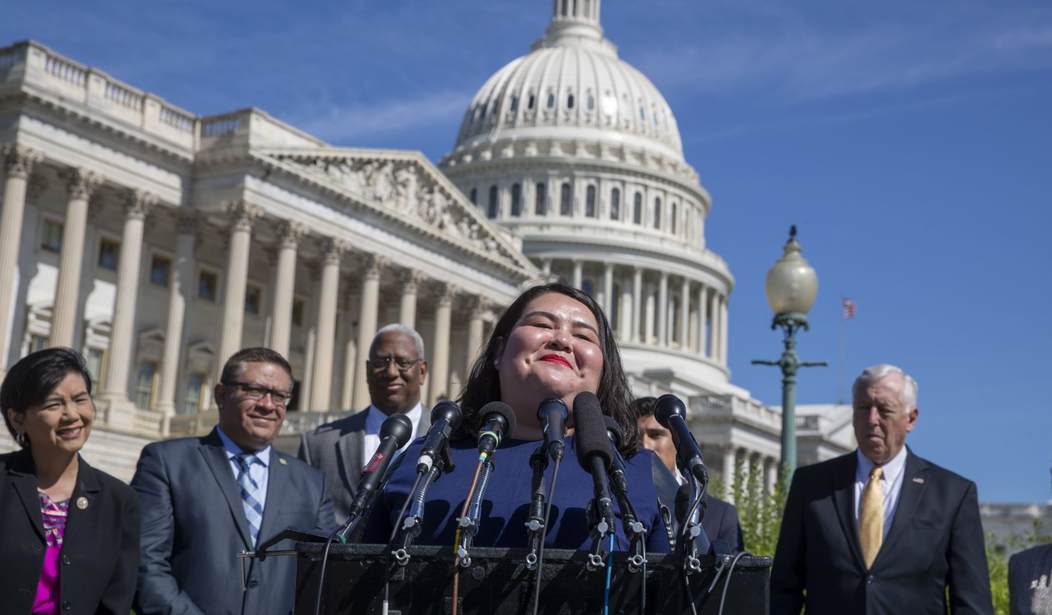To begin: federal judges have no authority — none — to countermand an executive order issued by the president of the United States in the lawful pursuit of his executive function under Article Two of the Constitution. And yet, so out of line has the lesser judiciary — that is to say, every federal judge below the Supreme Court level — become that we have now arrived at this blatantly unconstitutional pass.
A federal judge on Friday ordered a total restart of the Deferred Action for Childhood Arrivals (DACA) program, in a hit to the Trump administration. The administration last year announced its plan to phase out the program, which provides a level of amnesty to certain illegal immigrants, many of whom came to the U.S. as children.
The order is not set to kick in right away, according to Politico, which notes that the government has until Aug. 23 to file a motion to appeal the ruling by U.S. District Judge John Bates. However, the judge denied a motion by the government to revise its earlier decision in April — which determined that the Department of Homeland Security’s decision to rescind DACA was “unlawful,” according to court documents.
Following that decision, the court issued a 90-day stay acknowledging that the “DHS could possibly remedy the decision’s inadequacies — at least in theory.” That period of time is now over, the judge said. “For the reasons explained below, the government’s motion will be denied,” the document read. “Although the Nielsen Memo purports to offer further explanation for DHS’ decision to rescind DACA, it fails to elaborate meaningfully on the agency’s primary rationale for its decision: the judgment that the policy was unlawful and unconstitutional.”
Bollocks. As I’ve frequently noted on this site, the lower federal courts are entirely creations of Congress, and thus subordinate to it. And they certainly have no authority over the executive branch, other than that which they have aggrandized unto themselves via Marbury v. Madison and other rulings of dubious constitutionality. The notion that the three enumerated branches of the federal government are “co-equal” is a polite fiction to disguise the fact that the Supreme Court (Article Three) is the last and least of them, and can be stripped of all jurisdiction except its enumerated powers any time Congress so ordains.
So where does Judge Bates get off deciding that the administration’s reasons for overturning an Obama executive order are insufficient?
The aforementioned memo from DHS Secretary Kirstjen Nielsen provided “additional ‘policy’ grounds” to undo DACA, the judge wrote. However, he added that “most of these simply repackage legal arguments previously made,” making them “‘insufficiently independent from the agency’s evaluation of DACA’s legality’ to preclude judicial review or to support the agency’s decision.”
In closing the brief, the judge wrote that at no point in this ruling, or the previous one, did the court contend that the DHS didn’t have “the statutory or constitutional authority” to end the program. “Rather, the court simply holds that if DHS wishes to rescind the program – or to take any other action, for that matter – it must give a rational explanation for its decision,” the judge wrote. “A conclusory assertion that a prior policy is illegal, accompanied by a hodgepodge of illogical or post hoc policy assertions, simply will not do,” the judge wrote. “The court therefore reaffirms its conclusion that DACA’s rescission was unlawful and must be set aside.”
Let’s call this what it is: an attempt by a single judge in the District of Columbia to usurp the power of the executive simply because he doesn’t like the substance of the administration’s arguments. But the only argument the administration needs is: “because.”
The Left prefers to implement its policy preferences via the courts, because it only takes a handful, or even one, to overturn the will of the people. But our system of government as founded — and as re-articulated by Abraham Lincoln in the Gettysburg Address — is devoted to the proposition that here the people rule via their elected representatives, not judges.
The President is every bit as much the arbiter of the Constitution as is the Congress or the Supreme Court; if Trump’s ready to tackle the problem of the runaway federal judiciary, this would be a great test case. Because, sooner or later, it’s a battle that needs to be fought and won if the constitutional balance of power is to be protected. To paraphrase Andrew Jackson, “John Bates has made his decision — now let him enforce it.”









Join the conversation as a VIP Member